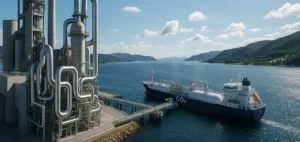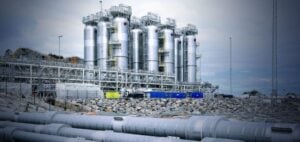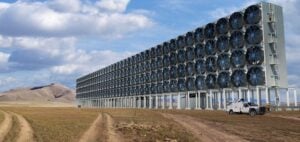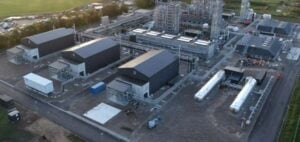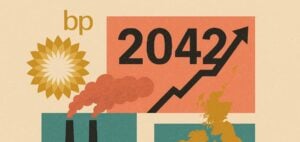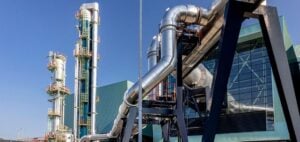Haffner Energy and IðunnH2 sign an agreement to integrate biocarbon gasification technology into the production of sustainable aviation fuel (e-SAF) in Iceland.
This partnership addresses the supply constraints of biogenic CO2, a costly resource that is difficult to obtain locally, despite Iceland’s abundant renewable energy sources.
Haffner Energy’s innovation is based on the supply of biocarbon, a solid by-product from the thermolysis of biomass, which can be gasified on site to generate biogenic carbon.
This simplifies logistics and reduces costs, boosting the project’s profitability.
The IðunnH2 project, based in Helguvík, is targeting a capacity of 65,000 tonnes of fuel per year, to be blended with conventional kerosene for commercial flights.
Production is due to start in 2028, using green hydrogen from Iceland’s geothermal, wind and water resources.
The project is designed to meet European Union directives on sustainable aviation fuels, which require a gradual increase in the SAF blending ratio over the coming years.
Challenges and opportunities in FAS development
The sustainable fuels market is experiencing dynamic growth, supported by environmental regulations in Europe and elsewhere.
SAF production is based on the use of green hydrogen combined with recycled carbon, ideally of biogenic origin.
However, the scarcity of biogenic CO2, particularly in Iceland, is an obstacle to the development of these projects.
By replacing captured CO2 with easily transportable and storable biocarbon, Haffner Energy’s technology reduces the complexity of the supply chain and the associated costs.
By integrating this innovative approach, IðunnH2 is positioning itself to become a key player in the production of SAF in Iceland, with a model that could be adapted to other similar markets.
The use of on-site biocarbon bypasses logistical and financial limitations, making the project more robust and resilient to fluctuations in raw material costs and regulatory constraints.
Economic and strategic impact of the project
Integrating bio-carbon technology into the IðunnH2 project offers both economic and strategic benefits.
By reducing dependence on imported fossil fuels, the project contributes to Iceland’s energy security.
It also optimizes the use of local renewable resources, while meeting emission reduction requirements for the aviation sector.
The production capacity of 65,000 tonnes per year represents around 15% of the country’s projected aviation fuel demand in 2028, and the commitments of airlines such as Icelandair, which plans to use up to 45,000 tonnes of SAF each year, support this trajectory.
The agreement between Haffner Energy and IðunnH2 illustrates how tailored technological solutions can overcome the obstacles associated with sustainable fuel projects, particularly in resource-constrained environments.
It’s a pragmatic approach to supporting the transition to cleaner energy sources, while ensuring economic and energy stability.
Outlook for the development of aviation fuels
The collaboration between Haffner Energy and IðunnH2 represents an important step in the optimization of sustainable fuel supply chains.
As the airline industry adapts to new regulations and emissions reduction targets, the availability of local, low-carbon supplies becomes crucial.
This model, which combines the use of green hydrogen and bio-carbon, could serve as a benchmark for other regions facing similar challenges.
The commitment of both companies demonstrates the importance of strategic partnerships for the development of new technologies and cost optimization in sustainable fuel projects.
By relying on continuous innovation and efficient management of local resources, it is possible to strengthen the competitiveness and sustainability of the aviation sector on an international scale.




